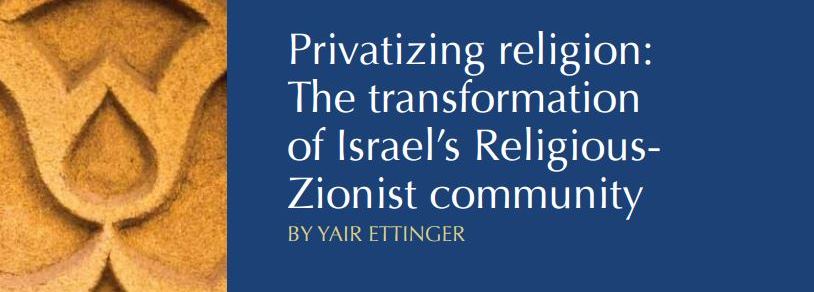Privatizing Religion
The transformation of Israel’s Religious-Zionist Community

This paper was published by Brookings Institution Press and is reprinted with permission.
Yair Ettinger discerns between different streams of Religious-Zionist Jews in Israeli society, and analyzes how these schisms play out in the socio-political arena. In his paper “Privatizing religion: the transformation of Israel’s Religious-Zionist community,” Ettinger highlights three prominent issues on which such internal battles are most visible: the level of deference paid to the rabbinate, the participation of women in the military, and political representation in Israel’s parliament, the Knesset.
Ettinger begins by arguing that while Israelis who define themselves as Religious-Zionists are more homogeneous than in the past in their hawkish views on the Arab-Israeli conflict, the community is becoming more religiously diverse. Meanwhile, he states that the hegemonic authority of its conservative rabbis is being undercut by a new set of religious narratives promoted by a number of grassroots religious and lay political leaders, such as Naftali Bennett.
Next, Ettinger examines the political ascent of Naftali Bennett and the influence that Bennett has had on Religious Zionist circles. Ettinger analyzes the new role of members of the Religious-Zionist community as the rising elite in Israeli society, a role usurped from the social sector. As a result, Religious Zionists have faced numerous challenges that have implications for Israeli politics and policies. Ettinger explains that these implications include the amplified role of the Jewish Home as an opposition to the Likud-led governing coalition, a greater divide between Religious Zionist factions and a changing relationship between Israel and the Jewish Diaspora.
Ettinger argues that Naftali Bennett’s rise to political power signaled that the rules had fundamentally changed regarding the pre-eminence of the rabbinical clergy. The Bennett era, Ettinger concludes, is a time of privatization of the major rabbinical monopolies. Thus, while Bennett will not remain in the Knesset forever, these processes will continue with or without him.
Read the full report, which was originally published by Brookings>>
